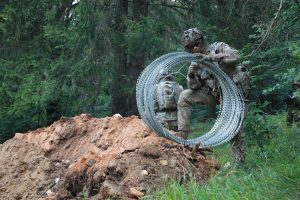Knowledge is Power (but only when shared)
We have all heard the phrase “knowledge is power.” What exactly does that mean? Does it mean I should hoard the knowledge I have? Should I keep it safe by refusing to allow my peers and subordinates access to it? Will having more knowledge, and subsequently more power, make me a better officer? Perhaps. Knowledge itself is not the end goal. The application of knowledge is the critical piece missing from the colloquial phrase. Ultimately, we are all part of a team called the U.S. Army. We win or lose as a team. We win or lose as a Division, as a Brigade, as a Battalion, a Company, and as a Platoon. Why then would we ever choose not to contribute to the larger effort of success of the team? Does our own ambition make us so shortsighted that we are unwilling to help a fellow platoon leader prepare for a small arms range? That we would leave a struggling peer to draft an OPORD by himself?
The Army is an hierarchical institution that incentivizes performance. It also happens to be a pyramid whereby there are fewer ranks at the top than the bottom. Naturally, this means you must be above the cut line to advance. Not everyone will get a trophy. Your knowledge accumulation and desire to leverage it only for your personal gain may set you apart from a peer you are competing with. Yet, that is contradictory to the team’s goal. If you give your knowledge to help a peer and they selfishly retain theirs, does that put you at a disadvantage? No. It sets you apart and makes you a valuable member of the organization.
A candle improves vision in a dark place. In isolation, it has the power of one. It isn’t very bright. But that candle can be used to light other candles. It can light an infinite number of candles without losing any of its original power. The beauty of sharing that one candle to light a hundred others is seen in the brightness of the room. Should one go out, there is redundancy to relight it.
A candle is like knowledge. Everyone benefits when it is shared, and the collective team is made stronger as a result. Sharing your knowledge doesn’t make you any less powerful. It does however demonstrate a maturity in understanding. Those who understand the value in building relationships understand one of the most critical components of a successful leader.
Knowledge sharing is fundamental to a winning team. It allows an organization to prosper. It fosters trust and innovation. It helps a unit to leverage the strengths of individuals rather than weaknesses. So, what does “good” knowledge sharing look like? It certainly doesn’t involve keeping your beautifully built range book hidden in your desk while a peer struggles to develop one. It doesn’t look like sharpshooting a presentation knowing full well the speaker doesn’t have the answer. It doesn’t look like highlighting the failures of others to make yourself look better.
Knowledge sharing is about setting aside petty differences and working towards a common goal. It requires selflessness and understanding. It sometimes requires empathy. It sometimes requires sacrifice. It may even require inequities. It most certainly requires opening up your knowledge and skills for the benefit of others. Your efforts will not go unnoticed. It will feel like a big investment up front and it will require constant nurturing, but it will pay huge dividends in the future. It is far better to be known as a reliable team player than a selfish rock star.
The Army is a team. It demands and expects team players. Good teammates make a conscious effort to share the ball. An assist is just as critical as scoring the goal. Winning in this business can only happen by sharing knowledge, and often, that requires using your candle to light another. Revisiting our phrase from the start of this piece: knowledge isn’t power, shared knowledge is power.
———
In the spirit of sharing knowledge, the Junior Officer space has many ways you can contribute. Consider submitting an LPD here, getting in touch to write an article for this blog, or contributing to our Facebook Page, Facebook Group, or our Instagram page, among other ways.
———
MAJ George Fust is a Military Intelligence Officer and currently teaches American Politics and Civil-Military Relations in the Social Science Department at the US Military Academy at West Point. He holds a master’s degree in Political Science from Duke University. He previously served in the 173rd IBCT(A), 207th MI BDE, and the 1st Infantry Division.
Image from: US Army Acquisition Support Center
Related Posts

Going Off Script, But Staying on Track: A Career Guide for Junior Leaders
Intro I walked into LTC Tomi King’s office as a new 2LT in his formation. We discussed all the normal talking points in that initial counseling – family, where I …

Fighting as an Enabler Leader
(U.S. Army Photo by Cpl. Tomarius Roberts, courtesy of DVIDS)Enablers provide capabilities to commanders that they either do not have on their own or do not have in sufficient quantity …

Defeating the Drone – From JMRC’s “Skynet Platoon”
If you can be seen, you can be killed—and a $7 drone might be all it takes. JMRC’s Skynet Platoon discuss their TTPs to defeat the drone.
